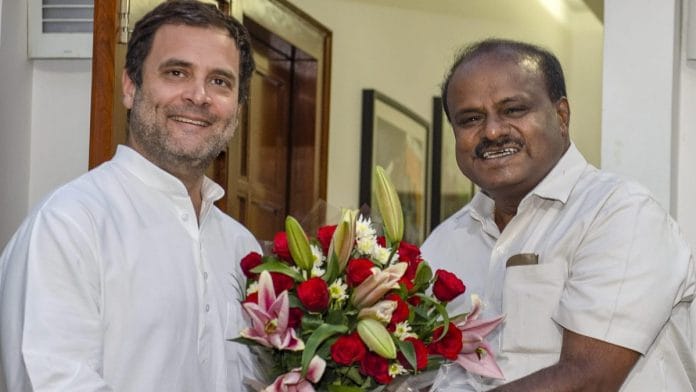Several unanswered questions remain as the Congress-JD(S) coalition government takes oath, including whether the grand old party is ready to play second fiddle at the national stage.
Bengaluru: H.D. Kumaraswamy will be sworn in as the chief minister of Karnataka Wednesday afternoon but it’s the wannabe prime ministers who are likely to steal the show at his swearing-in ceremony.
In attendance at the gala will be Congress president Rahul Gandhi, Nationalist Congress Party (NCP) chief Sharad Pawar, Bahujan Samaj Party (BSP) chief Mayawati, Andhra Pradesh chief minister N. Chandrababu Naidu and his West Bengal counterpart Mamata Banerjee.
They, along with a host of other regional chieftains, will be part of a ceremony that is expected to herald the arrival of a new political force, a ‘mahagathbandhan’ or grand alliance of anti-BJP parties, with razzmatazz. The spirit behind the Congress-JD(S) coalition in Karnataka might be the guiding force for an amorphous mahagathbandhan at the national level, but the same also exposes the inherent fault lines.
First, is the Congress ready for a redo of Karnataka at the national level?
The grand old party, which secured 78 seats against the JD(S)’s 37 in the assembly election, has chosen to play second fiddle to its coalition partner to keep the BJP away from power in the state. But when it comes to a grand alliance at the national level, senior Congress leader Digvijaya Singh spelt out the party’s view at the ThePrint’s ‘Off The Cuff’ last month: “The body wags the tail, the tail cannot wag the body.” He may not be Rahul Gandhi’s porte-parole any longer, but that’s the prevailing opinion in the Congress. And Rahul echoed as much when he expressed his readiness to become the Prime Minister recently.
Second, is the Congress ready to be accommodative to regional parties?
The fact that only the deputy chief minister (G. Parameshwara) will be sworn in along with Kumaraswamy Wednesday shows the complications in a marriage of convenience.
The Congress might have readily agreed to Kumaraswamy being chief minister for the full five-year term, but it wants control of other levers of power by wresting plum portfolios. The two parties agreed to discuss the contentious issue of portfolio allocation after the swearing-in ceremony. Obviously, the Congress, as a pan-India party (regardless of the likely protestations by the BJP), is not inclined to cede its turf to a regional party for what it sees as a temporary need to check the BJP’s forays into terrains hitherto claimed by the grand old party.
Third, does the Congress see in Karnataka results a thumbs-up for an anti-BJP alliance?
It was H.D. Deve Gowda, not Sonia or Rahul Gandhi, who was making the calls to invite regional leaders. Delhi chief minister Arvind Kejriwal, who didn’t get an invitation from the Congress to Sonia Gandhi’s gala dinner for opposition leaders two months ago, has been invited by Deve Gowda. It seemed the so-called tail was trying to wag the body while the latter reticently agreed to go with it. While Mamata Banerjee saw in Yeddyurappa’s resignation a victory of the ‘regional front’ and the DMK’s M.K. Stalin wished that it herald the coming together of secular parties, Rahul’s reaction was limited to a diatribe against PM Modi, the BJP and the RSS.
Fourth, is the Congress prepared to share room with regional parties?
The answer is, it is unlikely. The JD(S) wanted a pre-poll tie-up with the Congress but the latter saw no benefit in it. An analysis of the poll results in Karnataka showed that if the two had come together, they would have swept the elections, securing about 150 of the 222 assembly seats that went to the polls on 12 May. But, despite being under duress due to the BJP’s seemingly unstoppable juggernaut, the Congress chose to go it alone. In the 2017 Gujarat assembly election, former Uttar Pradesh chief minister Akhilesh Yadav had offered to campaign in Narendra Modi’s home state for “secular parties”, but the Congress was lukewarm to the idea.
No wonder, Yadav was travelling in poll-bound Madhya Pradesh last week, declaring his intention to field candidates from all assembly seats. The Congress has always been wary of ceding room to regional parties, especially in states where it counts itself as the dominant force. Imagine the Congress’ response if Mamata Banerjee — after the recent civic polls in which the Congress was trounced even in its pocket borough of Malda and Murshidabad — offers a pact where the grand old party can only contest the four Lok Sabha seats, of the state’s 42, it won in 2014.
Fifth, can anti-BJPism be an alternative political philosophy to anti-Congressism?
The Janata Dal (Secular), the new ally of the Congress, has its genesis in the Janata Party, the anti-Congress coalition that was founded in 1977. And so do many other regional parties whose heads will come together to celebrate Kumaraswamy’s coronation Wednesday.
Anti-BJPism may be a convenient political philosophy for them at this stage but that doesn’t make them natural allies of the Congress. Just as the Congress and the JD(S) are uneasy about their alliance — as voiced by Kumaraswamy, his deputy-in-waiting G. Parameshwara, and D.K. Shivakumar, even while the two parties were preparing to form a coalition government — other regional chieftains have reservations against the grand old party. They may come together with Sonia and Rahul Gandhi at Kumaraswamy’s oath-taking ceremony but political convenience is no solution to ideological dichotomies.
Despite the hype about Wednesday’s gathering of opposition leaders, there are no clear answers to the above-mentioned questions. And, without those answers, the idea of a mahagathbandhan could be mere wishful thinking.






